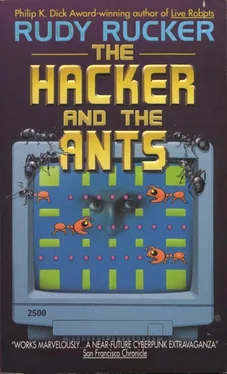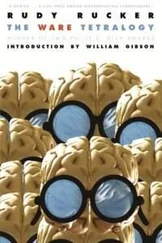Rudy Rucker - The hacker and the ants
Здесь есть возможность читать онлайн «Rudy Rucker - The hacker and the ants» весь текст электронной книги совершенно бесплатно (целиком полную версию без сокращений). В некоторых случаях можно слушать аудио, скачать через торрент в формате fb2 и присутствует краткое содержание. Жанр: Киберпанк, на английском языке. Описание произведения, (предисловие) а так же отзывы посетителей доступны на портале библиотеки ЛибКат.
- Название:The hacker and the ants
- Автор:
- Жанр:
- Год:неизвестен
- ISBN:нет данных
- Рейтинг книги:4 / 5. Голосов: 1
-
Избранное:Добавить в избранное
- Отзывы:
-
Ваша оценка:
- 80
- 1
- 2
- 3
- 4
- 5
The hacker and the ants: краткое содержание, описание и аннотация
Предлагаем к чтению аннотацию, описание, краткое содержание или предисловие (зависит от того, что написал сам автор книги «The hacker and the ants»). Если вы не нашли необходимую информацию о книге — напишите в комментариях, мы постараемся отыскать её.
The hacker and the ants — читать онлайн бесплатно полную книгу (весь текст) целиком
Ниже представлен текст книги, разбитый по страницам. Система сохранения места последней прочитанной страницы, позволяет с удобством читать онлайн бесплатно книгу «The hacker and the ants», без необходимости каждый раз заново искать на чём Вы остановились. Поставьте закладку, и сможете в любой момент перейти на страницу, на которой закончили чтение.
Интервал:
Закладка:
But let’s get back to the day when Susan Poker woke me, the day when I first saw a cyberspace ant.
After talking to Leonard, I drifted past the mailboxes and on down the virtual GoMotion offices’ hall. The mailboxes were buttons with people’s names on them, and if I’d pushed the Jerzy Rugby button, I would have seen a representation of all the e-mail and cy-mail messages waiting for me-e-mail being plain text or data, and cy-mail being a talking video image, possibly interactive. But just then I was more interested in finding out about the loose ant.
Right near the mailboxes was the door leading to Trevor Sinclair, our man on the Net. He was physically at the Sunnyvale GoMotion office every weekday. Trevor kept our machines talking to each other, and to the world at large, usually using cyberspace to do it. His virtual office was a life-size model of Stonehenge, accurate to a tolerance of one millimeter. He’d gotten the numerical specifications from some Chinese anthropologists, and he’d gotten the stone’s texture maps from a commercial computer compact disk called Rock.
There was a Wood disk too, by the way, and Clouds, Fire, Water, Skin, Metal-you name it, they were all in the Pixxy Textures Library, a data base of fifty CDs mounted on a rack which fit into a device known as a CD jukebox.
Trevor’s tuxedo showed a good-looking man with short red hair and freckles. Trevor was one of the few people at GoMotion who was over forty like me. Despite his age, he was boyish in his enthusiasm for druids and magic. He viewed our work in cyberspace as a rehearsal for true mastery.
Trevor could phreak and cryp with the best of them. “If I can physically get to a machine, I can always get in,” he liked to say. “The secret of Net control is to come on like a physical presence.” Here he’d pause and give a quiet chuckle. “Even when you’re not there.”
I found Trevor sitting on a wolfskin draped over a high plinth, ruminatively fondling the magic wand which he used instead of a mouse or a keyboard. Seeing me, he made a series of mystical passes with his hands. Simmies of lizards chased each other up and down the sides of the granite blocks.
“Thought for the day,” said Trevor. “How many light bulbs does it take to change a light bulb?”
“,” I said, or mimed, rather.
“Aw, Jerzy, you’ve heard it before!”
“You’ve told it before. But listen: there’s a loose ant in my system.”
“Ow,” said Trevor, and contorted his face into a hideous Punch-and-Judy grimace that grew and turned into the gargoyle at Notre Dame, into a cubic Julia set, and then into a cataclysmic explosion of knobby 3-D paisley. One of the fun things about talking to Trevor in cyberspace was that he made such great “faces.” The paisleys spermed off, Trevor’s normal body image returned, and his voice resumed.
“Let’s assume the worst hasn’t happened. Let’s assume the ants haven’t crawled out over the whole Net. I think that’s a reasonable supposition, or we’d be seeing ants right now.”
“Okay. But how can they be loose on just my machine?”
“If the ants can slave your display and drive your graphics output, that means they’ve established an Ethernet pseudonode with your address,” said Trevor. “A virtual back-end server.”
Half the time I didn’t know what Trevor was talking about. But there was never any use in asking, because he would just come back with more of the same. When talking to Trevor, the only way to proceed was to keep plowing forward. “So how do you think the ants got on my machine?”
Trevor made a gesture with his wand, and a scrolling screen of system log info appeared next to him. He laid his forefinger along the side of his nose and studied the list. “I rather strongly suspect you’ve been hosed by the Founder himself,” he said finally, with a bemused chuckle. “Roger Coolidge has been acting weird. More weird. He’s been talking about an ant eggcase. His idea was to compile a virtual ant server, tar the binary with a bunch of self-reproducing ant programs, and compress the whole viral mess into a self-extracting program that fits inside a user’s boot script. The log entries show that Roger accessed your boot script sometime last night. Some might call it an honor, Jerzy.”
As well as working on the a-life evolution of better programs for the Veep, I’d been working with Roger and his electronic ants. Roger’s interest in the ants had a different slant than mine. I liked artificial life because-like real living systems-a-life programs could do unexpected and beautiful things. The individual programs were what tended to capture my interest. Roger was more pragmatic. He was interested in using the GoMotion ants to model the dynamics of actual computer processes. When he did talk about science, he talked about things like species extinction and punctuated equilibria. In his home he had a large collection of expensive fossils that his wife had collected. The viruslike aspect of artificial life was also something that Roger had always found itchily fascinating.
I pointed my finger and flew through the wall of the ant lab at the end of the hall. The wall was made of industrial-strength cryp repellent updated daily by Trevor. Roger, Trevor, and I were the only people who could get into the ant lab. I expected to find Roger Coolidge’s body image in there, but for now Roger wasn’t there.
We’d been maintaining the cyberspace model of the ant lab so that it looked like a real bio lab, with a big black workbench, another bench full of tools, and a wall lined with cultures. We’d found that the most entertaining way to look at the ants was to let each colony drive a DTV chip to create its image.
Before going on, I have to explain about DTV, or digital television. The old analog TV standard had been known as NTSC. For years hackers had bitched that “NTSC” should stand for “Never Twice Same Color,” meaning that the old images had a radically inexact relationship to the signals. At first, people had thought the next video standard would be a more detailed picture carried by a fatter analog signal. But the proposed analog signals started getting so fat that manufacturers had to invent ways to compress them. And then all of a sudden the compression algorithms had gotten so good that it had become possible to think in terms of using a digital signal for TV instead.
The difference between DTV and regular television was like the difference between CDs and the old LP records. You coded the information as zeroes and ones instead of as a wavering line. It took a shitload of bits to code a whole TV show, but if you had good enough data compression it turned out to be more efficient than broadcasting in analog. The only catch was that a DTV signal didn’t look like anything on old television sets. To pick up DTV, your set had to have a DTV chip that could decompress the data and turn it back into uncompressed sound and pictures. It had taken a few years for the transition to happen, but DTV was the only kind of television around anymore, and DTV chips were cheap.
Getting his ant simulations to run on DTV chips had been one of Roger’s unbelievable now-I-will-levitate hacks. But it worked great. Standing in the empty ant lab I looked at the wall of virtual screens snowing ants-this was all taking place in cyberspace, remember, so the ants’ DTV info was actually being routed into image-generation software that was being patched into the image which my goggles maintained. The ants looked more agitated than usual, and there seemed to be more of them.
All of a sudden something appeared in the ant lab with me, a figure that seemed to be Roger Coolidge in his usual tuxedo of gray pants and short-sleeved polyester shirt, looking at me in that moony, pop-eyed, passive-aggressive way he had.
Читать дальшеИнтервал:
Закладка:
Похожие книги на «The hacker and the ants»
Представляем Вашему вниманию похожие книги на «The hacker and the ants» списком для выбора. Мы отобрали схожую по названию и смыслу литературу в надежде предоставить читателям больше вариантов отыскать новые, интересные, ещё непрочитанные произведения.
Обсуждение, отзывы о книге «The hacker and the ants» и просто собственные мнения читателей. Оставьте ваши комментарии, напишите, что Вы думаете о произведении, его смысле или главных героях. Укажите что конкретно понравилось, а что нет, и почему Вы так считаете.












